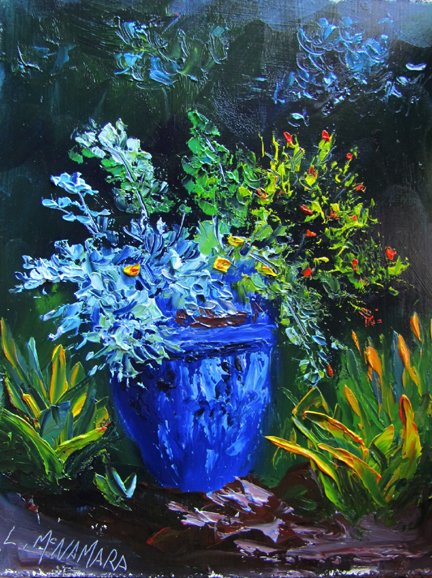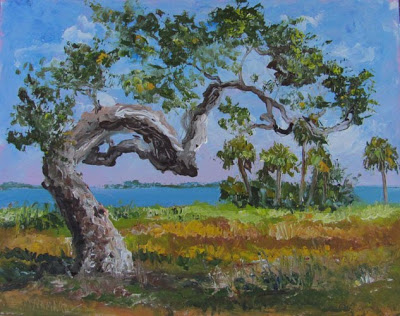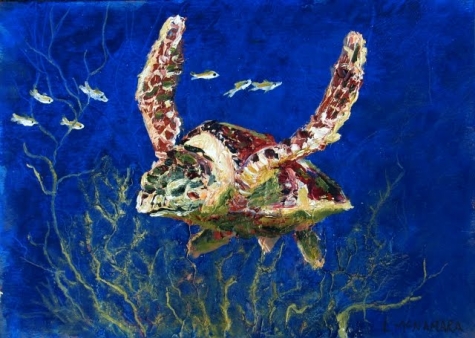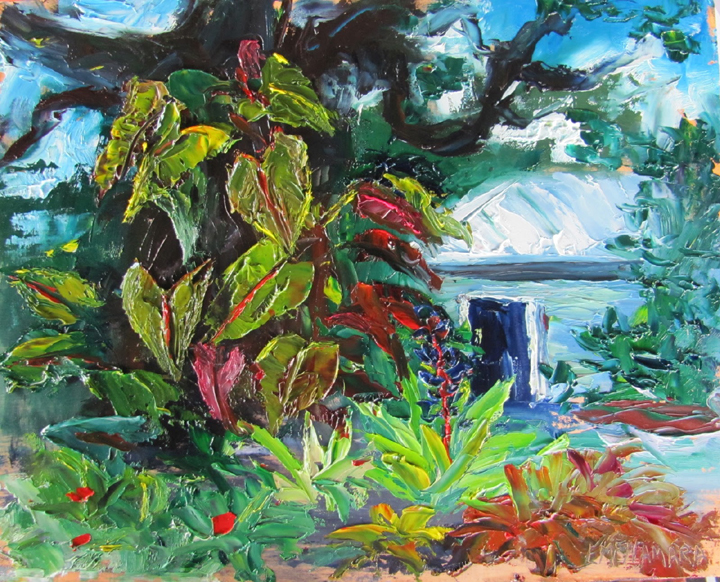
“Red Hibiscus” by Lori McNamara, oil on masonite
I ate a man for breakfast. My usual fare, only this one was on the gritty side. Too much meat on a stick and not enough apple. There was no struggle.
I didn’t have to forage, hunt or capture. He walked in to my cave. When he shined the flashlight on my pretty barbed tail — that’s where men’s eyes always seem to go first — his Adam’s apple made a little dip. He reached in and groped one of my scales. Now his picked bones lay strewn about the corners of my cave. No one ever said I was a good housekeeper.
Men are so easy to find this time of year. As soon as the temperature gets a little warm—all it has to do is rise to 50 degrees on the little thermometer posted above my door—and they come over that hill. Imagine walking twenty miles just to find a cave, but that’s what they do. They want to discover “the mystery.”
The men climb, they scale the boulders, and when they stop to set down their backpacks, that’s when the dark opening begins to beckon. Beneath a rocky overhang, behind the olive shrubbery with the small white flowers, they can’t help themselves; they have to explore. I wish they would pack better lunches in those backpacks of theirs. Guys, fewer processed meats. More celery, more apples, please!
Even if they hesitate and are a tad shy, all I have to do is flash my scales—it could be my tail, my delicate knobby ankles, or the nape of my neck—I have a really long nape, and they rush in. Fools.
No need for conversation.
To be fair, most don’t want to talk anyway. They go right for the scales, gawking at them, reaching out their small, veined, hairy paws.
If I were more of a conversationalist, I might say, would you please try not to stare while I bludgeon you. I hate the way their eyes bulge as if they were watching some creepy horror flick. It’s really unappetizing. I knock their heads off with a swift blow and pile them up for later, for when my blood sugar gets low and I need a snack.
The main course I baste with succulent plants from around the cave, mosses, lichens and spongy spores, and scorch with a little fire. Easy does it on the gas. No one likes charred meat. Best to keep it a little pink inside.
If I want something really tasty, I’ll roast my meal slowly on a spit. Felled pine makes a good skewer. And on those spring and fall days when there’s too much of a good thing, I make shish kebabs with the choicest thighs, rump, or rib meat and throw everything else to my friends in the woods. I brush on my special liverwort marinade, a family recipe, and let it soak for a few hours.
When I taste the meat, it’s tender to the bone, which I often gnaw on for added calcium. For the most part, I spit out the necks. They’re all tendons and gristle.
This next guy is different. I’m in no hurry. He isn’t either. He slumps at the entrance and observes the thermometer, actually strokes his beard. A thinking man. Haven’t seen one of those in a while, not since Sir Thomas Elyot.
Sir Thomas waited and asked permission to enter but not before convincing me on bended knee that drakons, from the Greek word “to gleam,” have the right to be respected, to be admired for our intelligence and wit, and not just for our sleek scales.
“Call me Tommy,” he insisted, after I invited him in. When the fire built in my chest, I shot it away from him, and he marveled at my power, exclaiming “what a wyvern!”
Fire proved our undoing. On Day 2, he began coughing from smoke inhalation and on Day 3, left as I slept. Had I known, I would have consumed him, rather than let him go.
After, I lost my appetite, and my mother had to come from ten hills over to spoon-feed me boiled intestines. One night, when I refused to eat, she told me about her Sir Thomas.
“He professed his love, said he would take me to an island with so much fruit I would never have a sugar low. But his wife got sick and he couldn’t let his daughters be orphans.”
“What happened to him?”
“Oh, Sir George told a story about slaying me—to save face—he didn’t want people thinking he spent all that time with an ophidian for nothing. But then he died from typhus on the boat back, after bragging to his mates. Or so I heard, from a hydra.”
“I never realized. Do you mind if I ask…?”
“Fire away.”
“How’d you meet my father?”
“He was passing through . . . No one ever said love has to love you back.”
Eventually, my appetite returned. And nothing quelled my growling insides. For five hundred years, my flames have scorched every man who dares approach. I swore never to lose my appetite over a man again.
This guy, this thinker, takes an ink pen and scribbles into a book. I want to get my hands on it. My last good read was The Book of Lost Tales. He sits on a boulder and continues writing.
I flash my scales, undulate a bit. That’s all it would normally take, but this one’s oblivious. I wonder just what I am dealing with. He keeps jotting down notes and I creep to the entrance, my head bumps the roof, and I peer out. My tail is fully out, the barb waving in his face, but he does not react.
I step outside. Usually there is no need.
This man wears shorts with many pockets, a baseball cap and windbreaker. I wonder what is so interesting that he must write it in that book. The suggestion of soft ferns at the entrance? The promise of the pit behind the flowering privet? The lure of bacterial odor and bursting spores? But no, he doesn’t notice any of that. He looks up, glances back at his notebook, looks up again.
I wave my tail. But he stares deeply into my canker-lidded, diamond-shaped eyes. This thinker, this notebook scribbler sits on his boulder, his worn wool socks drooping around his ankles, and meets my gaze.
“Hello,” he says.
“Hello.” I try not to breathe too much fire. I don’t want to scorch him. Yet.
“My name is Rodney,” he says. “What’s yours?”
“Jormu.”
“It’s a pleasure,” he says. Where’s his sword? I know he has one. They all do.
“What are you writing about?”
He looks down. Blurt it out. You can do it. “I came to figure out what to do.”
Okay, so I’ve had dramatic types before, projecting their voices, extending their hands. Of course I end up scorching them. I scorch them all. I do, I do, I do. Dragons like things in threes.
This one sits and writes and scratches the thinning hair on his scalp, he bleeds ink onto the page. I’m expecting at least one good monologue before I strike.
“My wife always told me what to do.”
My tail twitches. I don’t know whether to feel sorry, or be on high alert. Ever since my encounter with Sir Thomas, I don’t trust them not to become lunch.
“Leave you in the lurch, did she?”
His pen stops. I stab the notebook with my tail, lift it to my eyes and read. It is blurry. Must get more vitamin A. More sweet potatoes, guys. More leafy kale. The gist of it is, “I want to die.” Poor numbchuck. He’s wounded. I knew, knew, knew it. Men cannot resist my tail.
I sit on the boulder facing him. “Let me tell you a secret,” I say. I can feel the methane building.
He clutches his backpack.
“The answer you seek is not on this hill.” I strive to be dramatic myself.
“What if I am not seeking answers?”
“Why did you write, ‘I want to die’?”
He shakes his head.
“Okay, tell me why your wife left.” I encourage him to speak by sitting on my hind legs and tucking my wings. “You can tell me.”
“She died,” he says. “A plane crash, a Cessna four-seater. She was flying in a fog and hit a mountain.” He releases a huge exhale, completely devoid of fire. Men. They just don’t have it. “She planned my days. ‘Go to work. Tie your shoes. Balance the checkbook. Eat your spinach. Don’t forget to stretch.’” His shoulders shake, he does the self-hug thing.
I put my tail around his waist.
“But she was already dying. Ovarian cancer.”
I squeeze his shoulders with my wings.
“I should have told her: do the chemo, don’t fly today.” This man heaves great, wet sobs. He rests his head on my scales. I pat his tears.
“I have something to show you,” I say. “It grows in the darkest place and has a smooth velvety feel. Would you like to see it?”
“If it’s dark…?”
“You don’t need to see it. It’s feeling it that’s so fantastic. Go in.”
He hoists his pack. An apple rolls out. He sees me glance at it.
“Want it?” he says.
“You keep it.”
I swear, when he reaches for a scale, I am going to pummel him, put the apple in his mouth, and give him a good roasting. But he goes inside the cave instead and feels the furry algae. I let him put some in his backpack.
“I must say, this is not what I expected.” He follows the light back to the entrance. “I’ll never forget this.”
You’ll never forget, I think. Heard that before. It’s not worth explaining the loss and the heartburn, and asking myself three times a day, what if that was Sir Thomas? and then being left with only bones.
One more step and we would have both been safe. Rodney would have pulled up his socks and climbed down the boulders. Instead, he asks, “May I touch your scales?”
I knew, knew, knew it. No man can resist. This one, though, I feel truly sorry for: he misses his wife, and he asked permission first.
“If I let you touch me, I’ll have to eat you.”
He shuts his eyes.
“What?” I say. Little puffs of smoke shoot from my ears.
“I was hoping you would.”
“Eat you?” My wings flap gently, dispersing methane. “What makes you think I would?”
“A feeling.”
I curl my tail, trying to think. Here is lunch, and my sugar is low. Sir Thomas got away. I know I should let Rodney go—he is sad, he wants me to eat him. But I promised myself…
“Take the algae,” I say. “Go.” My wings flap. “Never speak of this.”
“You want me to leave?” He coughs.
“Yes, and don’t forget the algae.”
He stops inside the entrance. “Want my apple?” Still trying to tempt me. When I shake my scales, he turns his back. I no longer see his eyes. He no longer meets my gaze.
I keep my promise. I pummel him on the occipital lobe. I will never miss another meal. Not on account of Sir Thomas.
Wendi Berry divides her time between Richmond, Virginia and the Outer Banks, where she dreams of having a writers’ retreat, with an ocean view. A technical editor by day, she’s published in storySouth, Prime Number Magazine, Hulltown 360, and Hayden’s Ferry Review blog. She previously taught composition at the University of Richmond and J. Sargeant Reynolds and is seeking representation for a novel set in present-day Richmond.
Read an interview with Wendi here.













